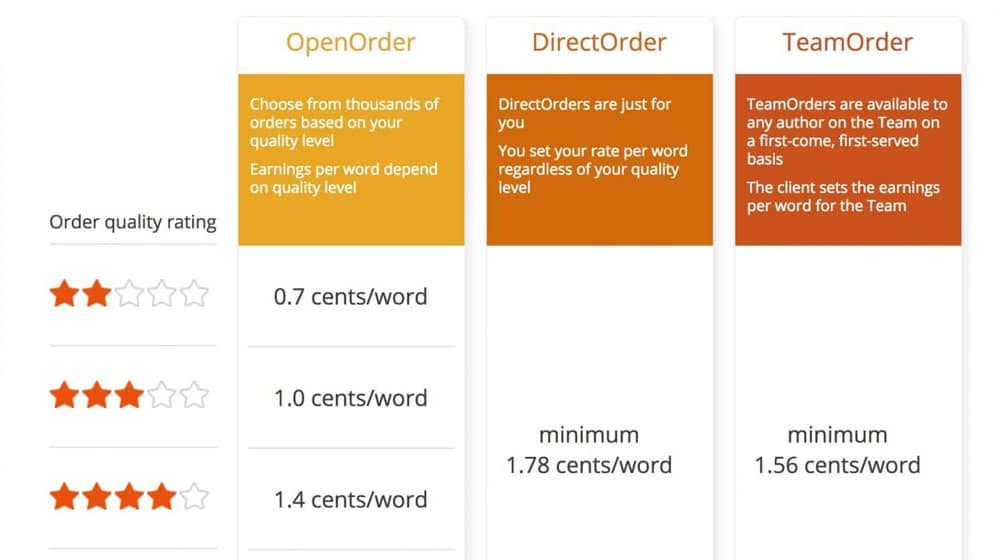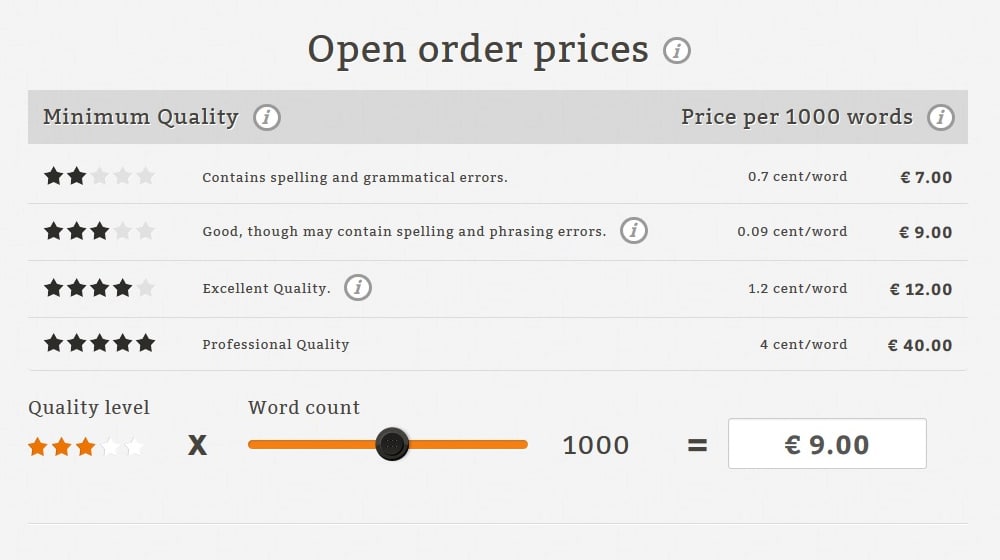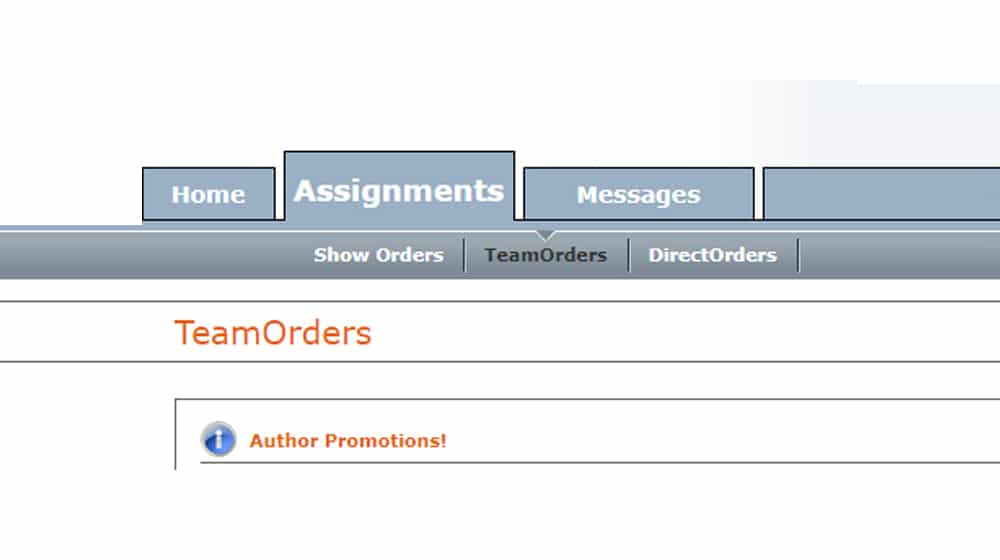What’s a Content Writers Mill and Should You Use One?

If you've spent any time looking into the idea of buying content rather than writing it yourself, you've probably come across terms like "content mill" or "writer's mill."
What are they, though, and are they worth using?
 30 Second Summary
30 Second Summary
You can use content mills to get cheap blog content written by freelance writers. When you submit an order, any writer in the pool can pick it up and write it for you. You'll pay around 2-3 cents per word, which means a typical blog post costs $25-50. You should only use content mills if you have a very tight budget or need to quickly fill a new site with basic content. The quality is usually low since writers rush to produce high volume. For better results, you'd want to work with professional writers or agencies who can create custom high-quality content.
The Freelance Writing World
For as long as literature has existed, there have been writers, and there have been ghostwriters. Ghostwriters, in case you don't know, are just writers who get paid in some way to provide content, in exchange for putting the name of their benefactor on it rather than their own.
It might surprise you, or it might not, that a huge proportion of the content you read online is ghostwritten. If you've seen some of these high-powered bloggers pumping out weekly posts of 5K or more words, while also running successful companies, traveling to speaking engagements, and spending hours in meetings around the world, and you've wondered how they manage to do it all, now you know.
They outsource. They pay writers to create content for them, and put their own name on it.

Now, there's nothing inherently wrong with this practice. Sure, it might be a little disingenuous, but it's not like it's theft. The person paying for the content typically does the legwork of generating the idea and guiding the draft, proposing changes, providing data or information to include, and so on. They don't just say "write me a post about social media marketing" and leave it at that, most of the time.
The writer, of course, is compensated for their work as well. They might not get their name attached to the content, but they get paid for their work, and for thousands of freelance writers across the country, that's enough for them. They make a living and don't need to worry about managing their own brand too much.
Freelance writers often follow a common trajectory.
Starting out, freelancers without experience tend to look for easy places to write. These are often free to register and post, like blogs they make themselves, or sites like HubPages. This allows them to earn some money and get some experience, though in many cases it doesn't earn them much. So they start looking for more defined opportunities.
This is where many freelancers stumble upon one or more of the content mills. They find sites like Make A Living Writing, which recommend various mills and opportunities for new freelancers. These sites are sites like Textbroker, Writer Access, Verblio, Constant Content, Writer's Domain, Skyword, and others. There are dozens of them, though there are fewer than there used to be.

This is where many freelance writers meet the end of their career. Content mills can be a lot of work, and can be very oppressive, for relatively little money. If the writer can't hack it, they often quit at this stage. Many also find a way to shortcut their work, and keep it as a side gig for their real job, or even just dedicate themselves to grinding out a living on the mills.
The freelancers that choose to push beyond content mills have a few choices to make. They can push for higher level writing agencies, join writing teams on sites like Michael Levin, or they can make a name for themselves as high-end professionals like Kristi Hines.
From there, it all comes down to how much the writer is able to market themselves. The sky is really the limit for a writer's career; I've known freelancers who get paid $1 per word or more for the projects they produce.
How a Content Mill Works
So what makes a content mill a content mill? It comes down to three things: there are a lot of writers in the pool, there are a lot of clients submitting assignments, and there's not a lot of money exchanging hands:
- For writers, working for a content mill is easy. They sign up for the site, usually taking a writing test to get an initial quality ranking, and then they are free to take assignments from an open pool. Some sites, like Writer Access and Textbroker, have teams they can apply for to gain access to more limited pools as well. They can also accept direct orders, through the platform of course.
- For clients – that's you – you sign up for a content mill. You put money on your account, buy credits, or otherwise pay to list assignments. This money is held by the content mill until you are given writing in return – in which case the writer is paid – or you cancel the project and are refunded. You submit orders to the open pool, where any writer of that quality level or above can pick it up, or to a team you form, or directly to a writer.
They write, you get a round or two of revisions, then you either accept or reject the post. Many content mills have penalties for writers if they're rejected – they want you to be satisfied, after all – so writers often cancel orders if they're asked for more than one round of revisions and think they might be rejected. It can be a hassle, but when it's their livelihood on the line, it makes sense.

The primary difference between something like Textbroker and a high end agency like Michael Levin's company is two-fold. High end agencies have much smaller pools of writers, cultivated for their talent. Content mills have much larger pools of writers, mostly of middling-to-low skill levels.
The other difference is the money exchanged. For Michael Levin, for example, they might pay a writer $10,000 or more to produce one e-book. For Textbroker, 4-star writers earn 1.4 cents per word. A blog post like the one you're reading right now would cost $25-35. That's a huge difference! So why do people use content mills?
Spec Work
Some content mills, like Constant Content or Verblio, operate on something called spec work. This is "speculation work", where the writer speculates that someone might like a piece of content they produce, so they produce it and put it up for sale. You can think of it like a standard marketplace.

For clients, this is a great option. You can log into a site and browse the work that already exists. Like shopping at a flea market or grocery store, if you see something you like, you can buy it. You own the rights that you buy – some sites only offer full rights, while sites like Constant Content offer different levels you can buy – and the writer gets paid.
From the writer end, this is a terrible way to do business. They do a lot of work and, unless they get lucky, they might never get paid for it. I've known writers who take years to sell individual pieces. Without an insane volume, this is unsustainable for most writers.
The Benefits of Content Mills (For Writers)
For a writer, content mills provide a few benefits. If they didn't, they all would have died by now.
The first and most important benefit is that a content mill acts as a sort of escrow account for work. The client – that's you as a business – pays the content mill, often putting money on an account or buying credits. You can then submit assignments to the pool of writers on the mill. A writer picks up the assignment and produces content, and if you accept it (or the grace period runs out), your money is given to the writer. This minimizes the chances that the writer will be screwed out of their work.

This is a huge concern for many writers. Companies have been known to exploit poor writers in the past. They put out a call of writer applications, with a custom submission prompt for the application process. They then use that content and never contact or pay the writer. This is theft and is illegal, but the writers they scam are generally too poor to afford legal action, so they get away with it. Content mills prevent that.
The second benefit to writers is steady work. Since content mills are cheap and prevalent, hundreds or thousands of businesses work with the mill, so there's always work there available to be written. Freelancers like the consistency and the fact that they don't have to pitch themselves to companies, the companies come to them.
We create blog content that converts - not just for ourselves, but for our clients, too.
We pick blog topics like hedge funds pick stocks. Then, we create articles that are 10x better to earn the top spot.
Content marketing has two ingredients - content and marketing. We've earned our black belts in both.
The Benefits of Content Mills (For Businesses)
What about from your perspective? After all, you're probably a business owner looking to outsource the writing for your blog. What makes a content mill beneficial for you?
Primarily, the benefit comes from the cost. Content mills are, if nothing else, very cheap. You can get a full-length blog post for under $50, consistently. You're fairly well in control over the content you get, and can reject content that doesn't fit what you want, at least after you ask for one round of revisions.

Another benefit is that some writers might not know their skills, or have become complacent working for a mill. Sometimes you find very good writers who simply don't care to move on, and you can essentially exploit them by paying them less than they're worth. You can always tip them more if you feel bad, and there's always the chance they'll raise rates or move on, but it can be nice while it lasts.
The other potential benefit is speed. Since you don't have to wait for the schedule of one particular writer to open up, the posts you put in the open pool are likely to be picked up and written within a day or two. I've seen a turnaround of mere hours before. After all, these writers are making their living with volume, not with quality.
Therein lies one of the many problems with content mills.
The Drawbacks of Content Mills
For writers, content mills have a few drawbacks. For one thing, they're cheap. It takes a lot of work to make a minimum wage living, so writers often turn to shortcuts like templates, common language, and a basic style to pump out content quickly.
Another drawback is that there are often steep penalties for failure. If a client decides to reject a piece of content, the writer is penalized, and more than one or two such penalties can irrecoverably destroy that writer's account.
Textbroker in particular is bad at this. Editors come through and grade writer content, giving it their own internal star level, using the writer's star level as a baseline. This means a 4-star writer will generally have 4-star baseline ratings. A 3-star writer will see primarily 3-star ratings, even if their content is 4-star worthy. The editors aren't paid very well either, so they just go with the baseline for most things in an effort to grade hundreds or thousands of articles quickly enough to make money.
What this means is that if a 4-star writer is penalized a couple of times, they can be dropped to 3-star. Once they're 3-star, the editors don't care about context and simply keep rating their content at 3 stars, making it impossible for the writer to regain their ranking. They're stuck, and have basically lost their livelihood.
This is why, as clients, if you frequently request revisions you'll find that many writers will simply drop a project before you have the chance to reject it. There's a much lighter penalty for dropping a project than for a rejection.

Another of the primary drawbacks for clients is that writers are pumping out content quickly. They don't consider the context of your site, because they don't know it and they don't care. They take your assignment at face value and produce the most basic, easiest to write content they can for it.
The low price point and high turnover rate also means that you might not be getting the same writer more than once. Assignments tend to be picked up very quickly, on a first come first served basis.
On top of all of that, the low price point attracts writers from non-US countries, many of whom speak English as a second language. This means you might not be getting grammatically correct or high quality content. After all, you get what you pay for, right?
If you as a client are willing to put more time into it, you can look for specific writers whose content you like and hire them directly through the platform, with direct orders. This is, of course, subject to the writer being able to take the work, though many writers will be happy for the consistency. They might have higher prices than open orders, though.
You can also develop a team. Creating something like a team on Textbroker or a love list on Writer Access means you can curate a small team of better writers to treat as a curated open pool. Again, you end up with better writers, but a slower turnover rate and higher pricing.

Content mills also tend to be very, very protective of their writers and their clients. As a client, you register with your business name, but all the writer sees is something like "Client 399472". You'll see the writer's name, and you can communicate with them via direct messages, but you have to use the platform.
More importantly – and more invasively – the content mill will monitor and censor your communications, both in your order posts and in your direct messages. You can't ask for or send an email address or even your company name, or any other way that would allow you and the writer to contact each other outside of the platform.
After all, the content mill is taking money off the top. For 4-star level on Textbroker, for example, the client pays 2.1 cents per word but the writer makes 1.4 cents per word. The .7 cents per word difference is pocketed by the company. If you were to contact the writer outside of the platform, the platform loses the revenue from your orders, and they don't want that.
Should You Use a Content Mill?
So now we come to the real question: should you use a content mill? Are they worthwhile, or is it just going to be a waste of time and money?
The way I see it, a content mill is useful in three particular circumstances.
First, they're useful if you have a very limited budget. The primary defining factor of a content mill is that it's cheap. If you only have a couple hundred bucks to spend on content each month, you have the choice between one great, well-written post from a mid-tier writer or a dozen or more mediocre posts from low-quality writers. You aren't going to have earth-shattering high quality content for your blog, but you'll have something.
Second, they may be useful to fill out a brand new site. If you want to go from a new site to a site populated with content pretty quickly, you can just brainstorm a few dozen simple post topics and pay content mills a few hundred bucks to get them all written. You can then post all of that as seed content. It's not going to be great for SEO, but it should be unique enough to get your site at least starting to rank. Then you can work on producing better content and phase out the old content as you grow and improve.
Third, they're useful if you're into grayhat/blackhat SEO techniques like Private Blog Networks. Private blog networks need content, which needs to be unique enough that Google doesn't penalize the site, but since it's not a money site you don't care if the content is any good. Paying for cheap content from a mill is one way to fill out a PBN. We don't recommend this at all, as these strategies often violate Google's search quality guidelines and will most likely result in penalties.
If you're not in one of those circumstances, I recommend not using content mills. The quality you get is just too low, and your ability to work with high class writers is too limited. It's better to contract with a real agency instead, and get tailor-made, high quality content that actually benefits your site.



 30 Second Summary
30 Second Summary


February 17, 2021
Thanks for this! Wasn't aware of what a content mill was until today, didn't know that Textbroker was one either. After looking up definitions of 'writers mill' and 'content mill' im not confident I want my content written there.
February 17, 2021
Hey Kathryn!
I mean, content mills still have their purpose. If you need content translated or some cheap filler text knocked out for a project, it might be a good option. Some of the higher-end writers on these sites are very talented, but they also cost quite a bit. It's pretty much impossible to become a 5-star writer at Textbroker if English is your second language, for example, so the consistency is usually higher.
If you're paying $300-500 for a 5-star article between 2000-3500 words, you're venturing into content marketing agency territory. You could have a team creating images for you, optimizing your posts, uploading them, promoting them, coming up with topics for you - all for that same cost.
Content is one thing you don't want to cheap out on, and the definition of content mills is 'a place to get cheap content'.
I've used them plenty of times over the years for little odd jobs and projects where the content wasn't that important, but I wouldn't ever consider using this kind of thing in a blog post on a business site.
Thanks for your comment and I'm glad it helped you!
September 29, 2024
Thanks for explaining that! I've always wondered if content mills had better options.
October 07, 2024
Hey Carlton!
I'm really happy I could clear things up for you! Content mills definitely give you some pretty convenient options if you're looking for something fast and affordable. But you might want to weigh that speed against the quality you're getting. Personally I like to look at freelance networks too - these places often have talented writers who are excited to help out.
Have you tried any other places yet? You might find it interesting to compare experiences!
If you need any more tips I'm always here to help! 😄
September 22, 2024
Do you have any advice on how I can find better quality writers for a blog? It seems like content mills give you a lot of quantity but don't offer much consistency or quality.
September 26, 2024
Hey Lea!
You're right; finding quality writers can be pretty difficult. I like to check out freelancers with strong portfolios on Upwork or Fiverr. You might also want to ask other bloggers for direct referrals.
Sometimes you need to pay a bit more for that steady quality. You could try writing communities; you'll find some great talent there!
Good luck with your search! If you have any more questions feel free to ask 🙂